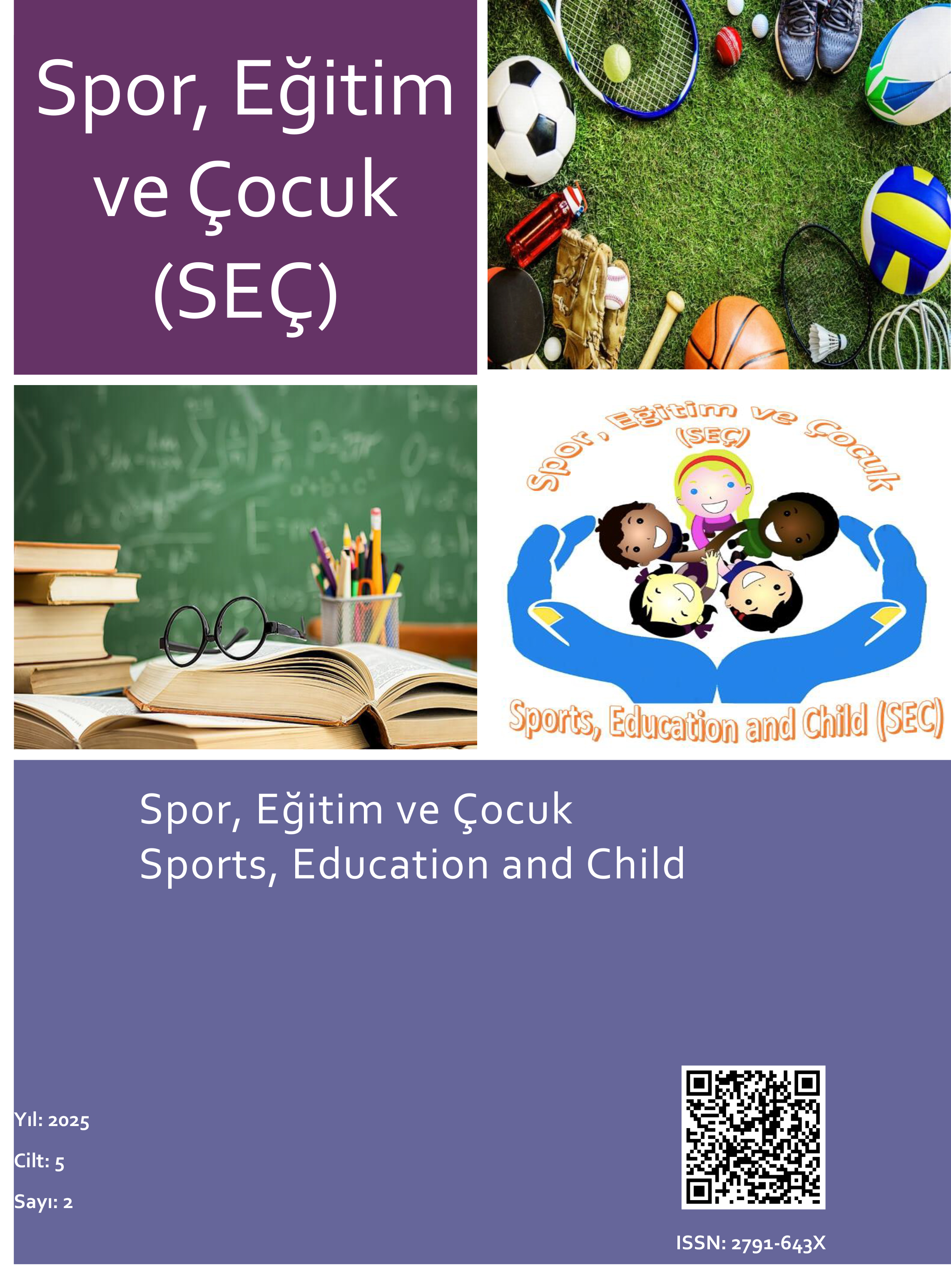Cilt: 3 Sayı: 3 - 2023
| 1. | Kapak Cover Sayfa I |
| 2. | İçindekiler Contents Sayfa II |
| ORIJINAL ARAŞTIRMA | |
| 3. | Mesleki ve Teknik Ortaöğretim Kurumu Öğrencilerinin Atölye Kullanım Oranları ile Yaşam Boyu Öğrenme Eğilimleri Arasındaki İlişkinin İncelenmesi Investigation of the Relationship Between the Workshop Utilization Rates of Vocational and Technical Secondary Education Institution Students and their Lifelong Learning Tendencies Özlem Muhcı, Kaine Gülözerdoi: 10.5505/sec.2023.30592 Sayfalar 1 - 8 GİRİŞ ve AMAÇ: Ülkemiz 2023 eğitim vizyonunda mesleki ve teknik ortaöğretim kurumları önemli yer tutmaktadır. Mesleki ve teknik eğitim bireylere mesleğe hazırlamanın yanı sıra yaşam boyu öğrenmeyi de desteklemektedir. Bu araştırmada mesleki ve teknik ortaöğretim kurumlarında atölye kullanımı ile öğrencilerin yaşam boyu öğrenme eğilimi arasındaki ilişkinin incelenmesi hedeflenmiştir. YÖNTEM ve GEREÇLER: Bu araştırmanın örneklemi Şanlıurfa ilinde Mesleki ve Teknik Anadolu Lisesinde öğrenci olan ve tesadüfi örnekleme yoluyla seçilmiş, elektrik elektronik teknolojisi alanında okuyan 186 öğrenci oluşturmaktadır. Bu çalışmanın verileri, araştırmacıların oluşturduğu kişisel bilgi formu ve Yaşam Boyu Öğrenme Eğilim Ölçeği (Gür Erdoğan ve Arsal, 2015) kullanılarak toplanmıştır. BULGULAR: Araştırmanın bulguları incelendiğinde tüm sınıf seviyelerinde bireylerin yaşam boyu öğrenme eğilimlerinin orta seviyede olduğu sonucuna ulaşılmıştır. Yaşam boyu öğrenme eğilimleri sınıf düzeyine istatiksel açıdan anlamlı bir değişkenlik göstermemektedir. Öğrencilerin yaşam boyu öğrenme eğilimleri ile atölye kullanımının öğrenme isteğine etkisi arasında pozitif yönde düşük seviyede istatiksel olarak anlamlı bir ilişki tespit edilmiştir. TARTIŞMA ve SONUÇ: Çalışmadan elde edilen sonuçlar incelendiğinde, ulaşılan ölçek ortalama puanının, ölçek ortanca puanının üstünde bulunmaktadır. Dolayısıyla mesleki ve teknik ortaöğretim kurumu öğrencilerinin çoğunlukla yaşam boyu öğrenme eğilimi içerisinde oldukları söylenebilir. Sınıf seviyesine göre yaşam boyu öğrenme eğilimleri ölçeği ortalamalarının belirgin farklılık göstermemeleri bu araştırmaya katılan öğrencilerin yaşam boyu öğrenme eğilimi ortalamalarının genellikle orta ve yüksek seviyede olması ile ilişkili olabileceği düşünülmektedir. |
| 4. | Ebeveynlere Uygulanan Duygu ve Empati Becerileri Eğitim Programının Etkisinin İncelenmesi Investigation of the Effect of Emotion and Empathy Skills Training Program Applied to Parents Samet Atadoi: 10.5505/sec.2023.69188 Sayfalar 9 - 20 GİRİŞ ve AMAÇ: Duygusal okuryazarlık öğrenilebilen ve öğretilebilen bir beceridir. Duyguları yüz ifadeleri aracılığıyla ifade etme ve anlama becerisi erken yaşlardan itibaren kazanılmaktadır. Yapılan çalışmalar ailelere verilen duygu eğitimlerinin çocukların duygusal becerilerini geliştirdiğini ortaya koymaktadır. Bu doğrultuda yapılan çalışmanın amacı ailelere verilen duygu eğitimlerinin ebeveynlerin duygularını ifade etme ve empati becerisine etkisini incelemektir. YÖNTEM ve GEREÇLER: Bu çalışmada kullanılan araştırma tasarımı, bir kontrol grubu olmaksızın "yarı deneysel ön-son test" olarak adlandırılan bir tasarım şeklinde planlanmıştır. Amaçlı örnekleme tekniği kullanılarak ilkokulda çocuğu olan 18 ebeveyn üzerinde uygulanmıştır. Katılımcıların demografik bazı özelliklerinin tespiti için Genel Bilgi Formu kullanılmıştır. Çalışmanın uygulamalarının etkililiğini test edebilmek için Duyguları İfade Etme Ölçeği ve Empati Düzeyi Belirleme Ölçeği kullanılmıştır. BULGULAR: Elde edilen sonuçlar incelendiğinde ebeveynlerin duygularını ifade etme becerilerinden yakınlık boyutunu, empati düzeylerinden de duygusal tepki boyutunu katılmış oldukları eğitimin etkilemediği görülmüştür (p>0,05). Fakat duyguları ifade etmede olumlu, olumsuz ve toplam puanda; empati düzeylerinde bilişsel empati, sosyal beceriler ve empati toplam puanda istatistiksel olarak anlamlı derecede farklılık olduğu bulgusuna ulaşılmıştır (p<0,05). TARTIŞMA ve SONUÇ: Diğer duygu sosyalleştirme türlerinde olduğu gibi, ebeveynlerin duygu ifadesi de duygu ile ilgili düzenleme de dahil olmak üzere çocukların sosyo-duygusal sonuçlarıyla ilişkilendirilmiştir. Dolayısıyla yapılan çalışma sayesinde ebeveynlerin çocuklarına duygu düzenleme ve duygu becerilerinde doğrudan etkilere sahip olabilecektir. Yapılan bu çalışmada da ebeveynlerin empati düzeylerinde artış olduğu görülmüştür. Bu sebeple empati eğitimlerinin verilmesi ebeveynler üzerinde dolayısıyla da çocuklarının üzerinde etkiye sahip olabilecektir. Çünkü yapılan araştırmalar, bakıcı-çocuk etkileşiminin derecesinin, gelişim üzerindeki bu çoklu ve birbirine bağlı etkilerin toplamını yansıttığı için sonraki gelişimin güçlü bir belirleyicisi olduğunu öne sürmüştür. |
| 5. | Depremi Deneyimlemiş Kız Üniversite Öğrencilerinin Deprem Sonrası Sosyal Destek Uygulamalarına İlişkin Fenomonolojik Bir Çalışma A Phenomenologıcal Study On Post-Earthquake Socıal Support Practıces Of Female Unıversıty Students Who Experıenced The Earthquake Abdulselami Sarıgüldoi: 10.5505/sec.2023.46330 Sayfalar 21 - 37 GİRİŞ ve AMAÇ: GİRİŞ ve AMAÇ: Türkiye, geçmişten günümüze depremlerin meydana geldiği aktif sismik bir hat üzerinde yer aldığından, Ülkede sık sık bu depremler yaşanmaktadır. Depremler sonucunda bölgelerin yalnız fiziksel yapısında değil sosyal yapısında da değişimler meydana gelmektedir. Göçler, hizmette aksamalar, toplumsal gerilimler, sağlık problemleri, ekonomik kayıplar, eğitimin aksaması gibi bir dizi farklı sorunlarda yaşanabilmektedir. Bunun yanında dayanışma ve yardımlaşma kaynaklı toplumsal bütünleşme gibi olumlu etkileri de bulunmaktadır. Bu çalışmanın amacı depremi deneyimlemiş kız üniversite öğrencilerinin deprem sonrası sosyal destek uygulamaları ile ilgili düşüncelerini irdelemektedir. YÖNTEM ve GEREÇLER: YÖNTEM ve GEREÇLER: Araştırma kapsamında çalışılan konuyla uyumlu olarak nitel araştırma yöntemlerinden biri olan fenomonoloji desen kullanılmıştır. Araştırmanın örneklemi seçilirken amaçlı örnekleme yöntemi tercih edilmiştir. Araştırmanın çalışma grubunu depremi yaşamış sekiz kız öğrenci oluşturmaktadır. Kahramanmaraş, Adana, Malatya, Hatay illerinin her birinden iki öğrenciyle çalışma gerçekleştirilmiştir. Depremi deneyimlemiş kız üniversite öğrencilerinin deprem sonrası sosyal desteğe dair düşüncelerini ortaya koymak amacıyla dört ana başlık; 1. Aile arkadaş ve yakın akraba desteği, 2. Duygusal destek, 3. Psikolojik destek, 4. Toplumsal ve kurumsal destek başlıkları altında açık uçlu sorular oluşturulmuştur. Hazırlanan görüşme formu yardımıyla veriler toplanmıştır. Toplanan veriler dört tema etrafında oluşturulmuş, daha sonra zengin alt temalara ayrılmıştır. Veriler örnek alıntılar ve olumsuz etki gibi farklı veriler yardımıyla desteklenmiş bu durum daha geniş bir analiz perspektifi sunmuş, verilerin betimsel yolla analiz yapılmıştır. BULGULAR: BULGULAR: Araştırmada toplanan verilere göre, depremzede kız öğrencilerin aile arkadaş ve yakın akraba desteği, duygusal destek, psikolojik destek, kurum ve kuruluş desteklerinin olduğuna yönelik bulgular elde edilmiştir. TARTIŞMA ve SONUÇ: TARTIŞMA ve SONUÇ: Analizler incelendiğinde depremi deneyimlemiş kız üniversite öğrencilerinin deprem sonrası sosyal desteğe dair aile arkadaş ve yakın çevre, duygusal destek, psikolojik destek, toplumsal ve kurumsal desteğe dair görüşlerinin çoğunun olumlu düşüncelere sahip olduğu sonucuna varılmıştır. |
| 6. | 2023 Danışma ve Hakem Kurulu 2023 Advisory and Arbitration Board Sayfalar E1 - E2 Makale Özeti | |











